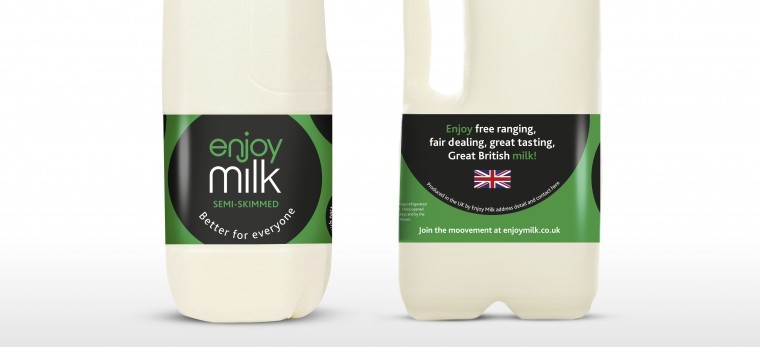From spring this year as cows go out to grass, Enjoy Milk branded cartons are set to appear in shops across the country. They will be supplied by farms which have signed up to fairer contracts and graze their cattle out doors on grass whenever the weather allows.
Enjoy Milk was started by Somerset farmer Nick Hiscox who set up the Free Range Milk Marketing Board (FRMMB) to supply the brand. Rob Ward, commercial adviser on the project, co founded The Grocery Accelerator which creates high street food and drink brands. “In the egg market, free range has grown by 117% in ten years,” Mr Ward said. “All the big supermarkets sell 100% free range and the brand makes up 45% of egg production. Free range eggs have grown consumption, boosted total production and increased the market for eggs.”
In the milk industry, five large supermarkets – Tesco, Sainsbury’s, Asda, Morrisons and the CoOp – sell 70% of fresh milk which is supplied by some 1,700 farmers, Mr Ward said. He estimates that each farm will have an average herd size of some 345 animals. “I don’t think many of those animals will be on a grazing system where they are outside as much as possible because it would involve such a lot of grass.”
This leaves some 7,800 dairy farmers who do not enjoy a direct supply relationship with supermarkets. “The supermarket system works well, and we are not knocking it,” said Mr Ward. “But these 80% of dairy farmers with herds averaging between 150 to 160 animals are not party to a direct supply system and they are very vulnerable to poorly drafted contracts.”
The plan is to recruit enough farms so that the FRMMB has a quarter of the market and supplies two billion litres of milk. The board is already almost half way there with one billion litres. In January, a social media campaign was launched to tell consumers about Enjoy Milk. In 20 days, there were 4,000 likes on Facebook and an average of 500 people are following each day.
Between now and the dairy herds going out to grass, there will be some market testing. Local dairy companies will be approached to see if they want to carry the distinctive Enjoy Milk black top on their milk cartons. As consumer demand builds, Mr Ward expects trade buyers to contact him about supplying supermarkets, too.
Every farm supplying Enjoy Milk has to be approved to ensure its grazing suits the production of free range milk. A strict definition of free range is not as important as ensuring that cows spend as much time as possible on grass, Mr Hiscox said. “If you say cows must be on grass for 180 days, what happens when someone rings up and says I have got to 178 days but the weather is bad so can I have permission to take the cows in? We have not gone for a maximum number of days because that does not give any incentive to try to do things better.”
With many milk supply contracts, farmers are locked in for one or two years. “Some buyers only tell you the price they will pay after they have picked the milk up. The way these contracts work is well known and it’s a blatant scandal,” Mr Hiscox said. The FRMMB contract will start by telling farmers what they will be paid for the next 12 months, he added. “In month nine, you will know what the price is going to be for the next 12 months – so that if you want to leave, you can.”
Arla, said Mr Ward, had already shown in its farmers’ milk campaign that a two litre bottle of milk will sell for £1.20 in a supermarket next to the same bottle of standard milk selling for 95p. In that case, consumers said they would pay more if the extra money went back to farmers.
Enjoy Milk two litre bottles will sell for about £1.25. “We are not just concerned with price,” Mr Ward said. “We want to give consumers value, so as well as the potential to improve prices, our milk is supplied on fair contracts from free range herds.”




